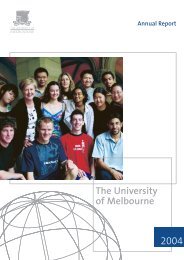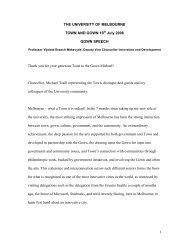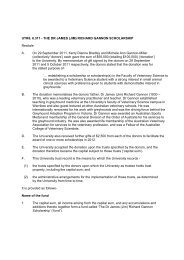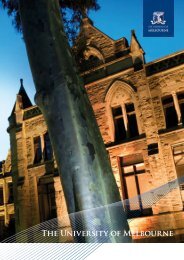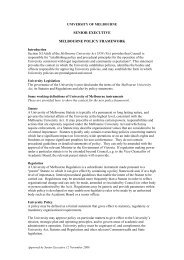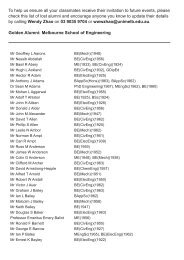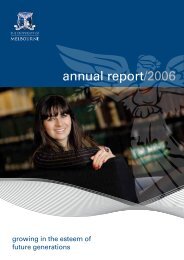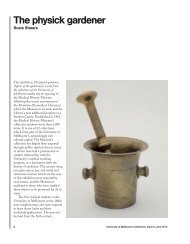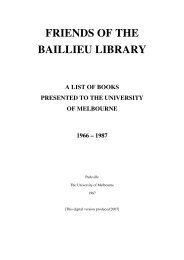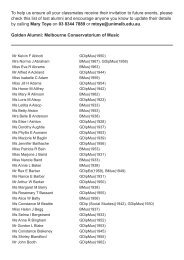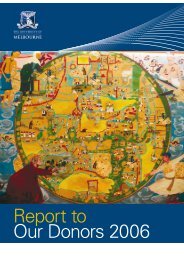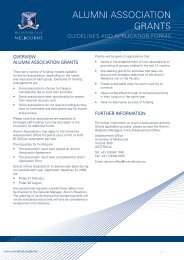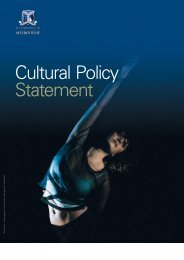2010 International Undergraduate Prospectus nts. u.au
2010 International Undergraduate Prospectus nts. u.au
2010 International Undergraduate Prospectus nts. u.au
You also want an ePaper? Increase the reach of your titles
YUMPU automatically turns print PDFs into web optimized ePapers that Google loves.
88<br />
Doctor of Medicine Q (from<br />
2011)<br />
Duration and campus<br />
4 years full-time<br />
Parkville<br />
Entry requireme<strong>nts</strong><br />
An undergraduate degree with a<br />
completion of the following prerequisite<br />
subjects: anatomy, physiology and<br />
biochemistry subjects<br />
The University of Melbourne’s Bachelor<br />
of Biomedicine or Bachelor of Science<br />
are ideal pathways to this graduate<br />
program.<br />
Extra requireme<strong>nts</strong><br />
Graduate Australian Medical School<br />
Admissions Test (GAMSAT) or the<br />
Medical College Admission Test (MCAT);<br />
and interview.<br />
Selection criteria<br />
Selection will be based on the academic<br />
record – grade point average (GPA)<br />
from a completed three or more years<br />
university degree, the GAMSAT and<br />
interview.<br />
More information<br />
School of Medicine<br />
Faculty of Medicine, Dentistry and<br />
Health Sciences<br />
t +61 3 8344 5890<br />
f +61 3 8344 7084<br />
e medicine-info@unimelb.edu.<strong>au</strong><br />
w www.medicine.unimelb.edu.<strong>au</strong><br />
Course description<br />
The new graduate program in Medicine will<br />
be a four-year graduate entry program with<br />
an emphasis on advanced clinical practice,<br />
research readiness and leadership. The<br />
course will prepare the student for the full<br />
range of clinical practice and research and<br />
provide bioscience teaching in worldclass<br />
research areas. It will begin with<br />
an integrated bioscience program led by<br />
clinical cases. Early clinical contact will<br />
be a feature of the program and will build,<br />
in a structured way, communication and<br />
clinical reasoning skills. The clinical years<br />
of the course will consolidate bioscience<br />
knowledge into a clinical context with an<br />
emphasis on evidence-based practice.<br />
Broad clinical experience in all disciplines<br />
will be followed by a period of in-depth study<br />
in the final year. A pre-internship program<br />
will complete the course.<br />
Fields of study: Anatomy, physiology,<br />
biochemistry, microbiology/immunology,<br />
pharmacology, pathology, medicine,<br />
surgery, primary care medicine, women’s<br />
and children’s health, psychiatry, emergency<br />
medicine, geriatrics, palliative care, rural<br />
medicine and more.<br />
Creating a world of career<br />
opportunities<br />
Graduates of the medical program after an<br />
appropriate internship program and medical<br />
board registration will qualify to enter all of<br />
the graduate programs offered in Australia<br />
(e.g. general practice, specialist medicine,<br />
surgery, radiology, pathology).<br />
Professional and international<br />
degree recognition<br />
The Doctor of Medicine is being considered<br />
by the Australian Medical Council as part of<br />
its standard accreditation processes.<br />
Q Pending Academic Board approval<br />
Haitao Pu (Richard)<br />
Graduate of the Melbourne JD<br />
Bachelor of Arts, East China<br />
Normal University (PRC) and MBA,<br />
La Trobe University (Australia)<br />
China<br />
Why did you choose the Melbourne<br />
JD program?<br />
I had just completed an MBA prior to<br />
starting the Melbourne JD. I thought<br />
the combination of MBA and a Law<br />
degree would open up a range of<br />
career opportunities in both legal and<br />
other industries. Given the reputation of<br />
Melbourne Law School and the course<br />
structure, I decided to choose the<br />
Melbourne JD.<br />
Describe your experience of the JD<br />
program. What were the highlights?<br />
The learning curve was very steep for<br />
me when I started JD without enough<br />
experience of the legal system of<br />
Australia. The first and second semesters<br />
were very challenging. I felt much more<br />
comfortable and confident after the<br />
initial two semesters – I even managed<br />
to win the ABL Corporations Law award<br />
and complete the GDLP program with<br />
Australian National University during my<br />
second year.<br />
Since graduating what are you<br />
doing now? How have you applied<br />
your skills and learning from the JD<br />
program?<br />
After a career in business in China and<br />
working as a solicitor at Mallesons<br />
Stephen Jaques in Melbourne, I am now<br />
an Associate at Sl<strong>au</strong>ghter and May,<br />
Hong Kong.<br />
What advice would you give<br />
prospective stude<strong>nts</strong> thinking about<br />
applying to join the Melbourne JD?<br />
I think a prospective student should first<br />
understand the legal profession and make<br />
sure he or she really wa<strong>nts</strong> to become a<br />
lawyer.




